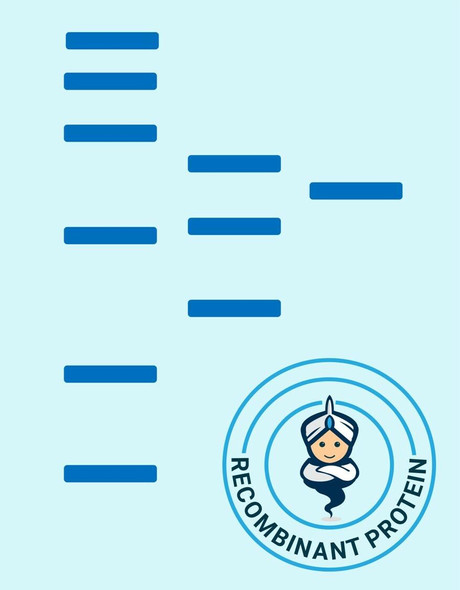Enzymes Recombinant Proteins
Human PAK4 Recombinant Protein (RPPB2595)
- SKU:
- RPPB2595
- Product Type:
- Recombinant Protein
- Species:
- Human
- Uniprot:
- O96013
- Research Area:
- Enzymes
Description
| Product Name: | Human PAK4 Recombinant Protein |
| Product Code: | RPPB2595 |
| Size: | 25µg |
| Species: | Human |
| Target: | PAK4 |
| Synonyms: | PAK-4, p21 (CDKN1A)-Activated Kinase 4, p21-Activated Kinase 4, Serine/threonine-protein kinase PAK 4, KIAA1142, PAK4. |
| Source: | Escherichia Coli |
| Physical Appearance: | Sterile filtered colorless solution. |
| Formulation: | The PAK4 protein (0.5mg/ml) contains 25mM HEPES pH-7.5, 150mM NaCl, 5mM MgCl2 and 30% glycerol. |
| Stability: | Store at 4°C if entire vial will be used within 2-4 weeks. Store, frozen at -20°C for longer periods of time. For long term storage it is recommended to add a carrier protein (0.1% HSA or BSA). Avoid multiple freeze-thaw cycles. |
| Purity: | Greater than 90% as determined by SDS-PAGE. |
| Amino Acid Sequence: | MRGSHHHHHH GMASMTGGQQ MGRDLYDDDD KDRWGSHMFG KRKKRVEISA PSNFEHRVHT GFDQHEQKFT GLPRQWQSLI EESARRPKPL VDPACITSIQ PGAPKTIVRG SKGAKDGALT LLLDEFENMS VTRSNSLRRD SPPPPARARQ ENGMPEEPAT TARGGPGKAG SRGRFAGHSE AGGGSGDRRR AGPEKRPKSS REGSGGPQES SRDKRPLSGP DVGTPQPAGL ASGAKLAAGR PFNTYPRADT DHPSRGAQGE PHDVAPNGPS AGGLAIPQSS SSSSRPPTRA RGAPSPGVLG PHASEPQLAP PACTPAAPAV PGPPGPRSPQ REPQRVSHEQ FRAALQLVVD PGDPRSYLDN FIKIGEGSTG IVCIATVRSS GKLVAVKKMD LRKQQRRELL FNEVVIMRDY QHENVVEMYN SYLVGDELWV VMEFLEGGAL TDIVTHTRMN EEQIAAVCLA VLQALSVLHA QGVIHRDIKS DSILLTHDGR VKLSDFGFCA QVSKEVPRRK SLVGTPYWMA PELISRLPYG PEVDIWSLGI MVIEMVDGEP PYFNEPPLKA MKMIRDNLPP RLKNLHKVSP SLKGFLDRLL VRDPAQRATA AELLKHPFLA KAGPPASIVP LMRQNRTR |
PAK4 is part of the group B family of p21-activated kinases (PAK). It's known as an effector protein for cell division cycle 42(Cdc42) and protein that plays an important role in regulating cytoskeletal organization and cell morphology. PAK4 expression is eminent in many cancer cell lines, and is involved in tumorigenesis. PAK proteins are significant effectors that associate Rho GTPases to cytoskeleton reorganization and nuclear signaling. PAK proteins are targets for the small GTP binding proteins Cdc42 and Rac and have been implicated in a wide range of biological activities. PAK4 cooperates specifically with the GTP-bound form of Cdc42Hs and weakly activates the JNK family of MAP kinases. PAK4 is a mediator of filopodia formation and is involved in the reorganization of the actin cytoskeleton. PAK4 activates the JNK pathway. PAK4 phosphorylates and inactivates the protein phosphatase SSH1, leading to increased inhibitory phosphorylation of the actin binding/depolymerizing factor cofilin. Decreased cofilin activity may lead to stabilization of actin filaments.
PAK4 Human Recombinant produced in E.Coli is a single, non-glycosylated polypeptide chain containing 628 amino acids (1-591 a.a.) and having a molecular mass of 68.3 kDa.PAK4 is fused to 37 amino acid His-Tag at N-terminus and is purified by standard chromatography techniques.
| UniProt Protein Function: | PAK4: a protein kinase of the STE20 family. A mediator of filopodia formation and may play a role in the reorganization of the actin cytoskeleton. Interacts specifically with the GTP-bound form of Cdc42 and weakly activates the JNK family of MAP kinases. Overexpressed in several cancers. Required for ras-dependent anchorage-independent growth of tumor cell lines. Four alternatively spliced human isoforms have been reported. |
| UniProt Protein Details: | Protein type:Kinase, protein; EC 2.7.11.1; Protein kinase, STE; Protein kinase, Ser/Thr (non-receptor); STE group; STE20 family; PAKB subfamily Chromosomal Location of Human Ortholog: 19q13.2 Cellular Component: focal adhesion; Golgi apparatus Molecular Function:protein binding; receptor signaling protein serine/threonine kinase activity Biological Process: apoptosis; cell growth; cell migration; cell motility; cell proliferation; cytoskeleton organization and biogenesis; mitotic cell cycle; signal transduction |
| NCBI Summary: | PAK proteins, a family of serine/threonine p21-activating kinases, include PAK1, PAK2, PAK3 and PAK4. PAK proteins are critical effectors that link Rho GTPases to cytoskeleton reorganization and nuclear signaling. They serve as targets for the small GTP binding proteins Cdc42 and Rac and have been implicated in a wide range of biological activities. PAK4 interacts specifically with the GTP-bound form of Cdc42Hs and weakly activates the JNK family of MAP kinases. PAK4 is a mediator of filopodia formation and may play a role in the reorganization of the actin cytoskeleton. Multiple alternatively spliced transcript variants encoding distinct isoforms have been found for this gene. [provided by RefSeq, Jul 2008] |
| UniProt Code: | O96013 |
| NCBI GenInfo Identifier: | 12585288 |
| NCBI Gene ID: | 10298 |
| NCBI Accession: | O96013.1 |
| UniProt Secondary Accession: | O96013,Q8N4E1, Q8NCH5, Q8NDE3, Q9BU33, Q9ULS8, B4DGG6 |
| UniProt Related Accession: | O96013 |
| Molecular Weight: | |
| NCBI Full Name: | Serine/threonine-protein kinase PAK 4 |
| NCBI Synonym Full Names: | p21 (RAC1) activated kinase 4 |
| NCBI Official Symbol: | PAK4�� |
| NCBI Protein Information: | serine/threonine-protein kinase PAK 4 |
| UniProt Protein Name: | Serine/threonine-protein kinase PAK 4 |
| UniProt Synonym Protein Names: | p21-activated kinase 4; PAK-4 |
| Protein Family: | Serine/threonine-protein kinase |
| UniProt Gene Name: | PAK4�� |
| UniProt Entry Name: | PAK4_HUMAN |






